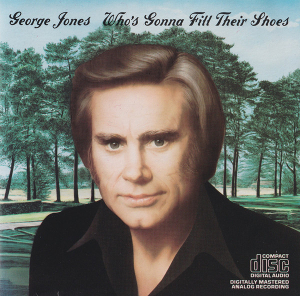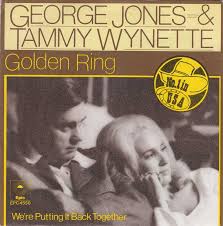Related Research Articles

George Glenn Jones was an American country musician, singer, and songwriter. He achieved international fame for a long list of hit records, including his best-known song "He Stopped Loving Her Today", and for his distinctive voice and phrasing. For the last two decades of his life, Jones was frequently referred to as "the greatest living country singer". Country music scholar Bill Malone wrote, "For the two or three minutes consumed by a song, Jones immerses himself so completely in its lyrics, and in the mood it conveys, that the listener can scarcely avoid becoming similarly involved." The shape of his nose and facial features earned Jones the nickname "The Possum". Jones has been called "The Rolls-Royce of Country Music" and had more than 160 chart singles to his name from 1955 until his death in 2013.

Johnny Paycheck was an American country music singer and Grand Ole Opry member notable for recording the David Allan Coe song "Take This Job and Shove It". He achieved his greatest success in the 1970s as a force in country music's "outlaw movement" popularized by artists Hank Williams Jr., Waylon Jennings, Willie Nelson, Billy Joe Shaver, and Merle Haggard. In 1980, Paycheck appeared on the PBS music program Austin City Limits, though in the ensuing decade, his music career slowed due to drug, alcohol, and legal problems. He served a prison sentence in the early 1990s, and his declining health effectively ended his career in early 2000. In autographs, Paycheck signed his name "PayCheck".
Troy Harold Seals is an American singer, songwriter, and guitarist.
Billy Norris Sherrill was an American record producer, songwriter, and arranger associated with country artists, notably Tammy Wynette and George Jones. Sherrill and business partner Glenn Sutton are regarded as the defining influences of the countrypolitan sound, a smooth amalgamation of pop and country music that was popular during the late 1960s and throughout the 1970s. Sherrill also co-wrote many hit songs, including "Stand by Your Man" and "The Most Beautiful Girl".
"He Stopped Loving Her Today" is a song recorded by American country music artist George Jones. It has been named in several surveys as the greatest country song of all time. It was released in April 1980 as the lead single from the album I Am What I Am. The song was Jones's first solo No. 1 single in six years. It was written by Bobby Braddock and Curly Putman. The week after Jones' death in 2013, the song re-entered the Hot Country Songs chart at No. 21. As of November 13, 2013, the single has sold 521,000 copies in the United States. Since 2008 it has been preserved by the Library of Congress in the National Recording Registry. The song was ranked no. 142 on Rolling Stone's 2021 500 Greatest Songs of All Time ranking.

You Oughta Be Here with Me is an album by American country music singer George Jones. This album was released in 1990 on Epic Records. It includes the singles "Hell Stays Open " and "Six Foot Deep, Six Foot Down", neither of which charted.

Wine Colored Roses is an album by American country music artist George Jones released in 1986 on the Epic Records label. It peaked at number 5 on the Billboard Country Albums chart. Wine Colored Roses went Gold in 1994.

Who's Gonna Fill Their Shoes is the 45th studio album by American country music artist George Jones, released in 1985 on the Epic Records label.

Shine On is an album by American country music artist George Jones, released in March 1983 on the Epic Records label.

The Grand Tour is an album by the American country music artist George Jones, released in 1974 as his fifth album for Epic Records. It peaked at #11 on the Billboard Country Albums chart and contained the hit title track, which reached a peak of #1 in August 1974.

Let's Build a World Together is the fourth studio album by the country music artists George Jones and Tammy Wynette. The album was released in 1973 on the Epic Records label. It peaked at number 12 on the Billboard Country Albums chart.

Me and the First Lady is the second studio album by country music artists George Jones and Tammy Wynette, released on August 7, 1972, on the Epic Records label.

A Picture of Me (Without You) is an album by American country music singer George Jones. It was released in 1972 on the Epic Records label.

Walk Through This World with Me is an album by American country music artist George Jones released in 1967 on the Musicor Records label.
"The Grand Tour" is a song made famous by country music singer George Jones. Originally released in 1974, the song was the title track to his album released that year. The song became Jones' sixth No. 1 song on Billboard's Hot Country Singles chart in August 1974, and was the fourth-biggest hit of the year. In 2014, Rolling Stone named the song number 38 on its "40 Saddest Country Songs of All Time".

"Golden Ring" is a song written by Bobby Braddock and Rafe Van Hoy, and recorded by American country music singers George Jones and Tammy Wynette. It was released in May 1976 as the first single and title track to their duet album of the same name. It was a number-one hit on the Billboard country chart.
"Loving You Could Never Be Better" is a song written by Earl Montgomery, Charlene Montgomery and Betty Tate, and recorded by American country music artist George Jones. It was released in April 1972 as the second single from his album George Jones . The song peaked at number 2 on the Billboard Hot Country Singles chart. It also reached number 1 on the RPM Country Tracks chart in Canada. The song was a good example of how producer Billy Sherrill had updated the sound of Jones' records, incorporating a laid back, R&B bass line. By drawing from such unlikely and disparate musical influences as Johann Strauss and "wall of sound" rock producer Phil Spector, he gradually began embroidering his own subtle permutations on the rather predictable fabric of country record production. "I just decided I'd do it my way, and screw 'em if they didn't like it," Jones biographer Bob Allen quotes Sherrill. "Back then, the musicians had their own repertoire of stock Nashville licks and chord progressions that would work on any song. But I often wanted something different, and I'd make 'em play it."
"I Don't Need Your Rockin' Chair" is a song written by Billy Yates, Frank Dycus and Kerry Kurt Phillips, and recorded by George Jones. It was the first single from his 1992 album Walls Can Fall.
"The Ceremony" is a duet by country artists George Jones and Tammy Wynette. It was released by Epic Records as the married couple's second single together in 1972 and reached No. 6 on the Billboard country survey.
"The Old Man No One Loves" is a song written by Wyman Asbill and recorded by George Jones for his 1988 LP Too Wild Too Long on Epic Records. It was released as the third single from the album but failed to make the Top 50, peaking at #63. The song pulls on the same heartstrings as Jones' biggest hit, "He Stopped Loving Her Today," complete with Billy Sherrill's sweeping production and a recitation recounting the protagonist's funeral. Jones also made his second music video for the song, the first having been "Who's Gonna Fill Their Shoes." "The Old Man No One Loves" was Jones' fourth consecutive single that failed to make the Top 25 on the Billboard country singles chart, which was beginning to be dominated by a new generation of country singers.
References
- ↑ Whitburn, Joel (2008). Hot Country Songs 1944 to 2008. Record Research, Inc. p. 214. ISBN 978-0-89820-177-2.
- ↑ Chadbourne, Eugene. "Who's Gonna Fill Their Shoes review". Allmusic. Retrieved 23 January 2011.
- ↑ Allen, Bob (1996). George Jones: The Life and Times of a Honky Tonk Legend. St Martin's Press. pp. 352–353. ISBN 978-0312956981.
- ↑ "George Jones Chart History (Hot Country Songs)". Billboard.